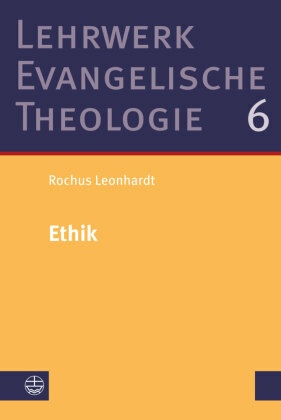
| Verlag | Evangelische Verlagsanstalt |
| Auflage | 2022 |
| Seiten | 664 |
| Format | 14,0 x 3,6 x 21,1 cm |
| Großformatiges Paperback. Klappenbroschur | |
| Gewicht | 780 g |
| Reihe | Lehrwerk Evangelische Theologie (LETh) 6 |
| ISBN-10 | 337407183X |
| ISBN-13 | 9783374071838 |
| Bestell-Nr | 37407183A |
Ethik ist eine wissenschaftliche Disziplin, in der die Frage nach dem moralisch richtigen Handeln des Menschen erörtert wird. Obwohl sie also keine spezifisch theologische Wissenschaft ist, begegnet sie im Spektrum der theologischen Fächer als eine Teildisziplin der Systematischen Theologie. Dies liegt daran, dass der christliche Glaube auch eine lebens- und damit handlungsorientierende Bedeutung hat.Das Lehrbuch des Leipziger Theologen Rochus Leonhardt widmet sich in einem ersten Teil der Etablierung der Ethik als einer philosophischen Disziplin und fragt nach der Spezifik der theologischen Ethik. Ein zweiter Teil thematisiert zentrale biblische Bezugstexte und Leitbegriffe der christlichen Ethik und stellt maßgebliche Ethik-Typen vor. Der dritte Teil behandelt wichtige individual- und sozialethische Themen. Leitend ist dabei die Orientierung an den rechtfertigungstheologischen Grundeinsichten Martin Luthers.[Ethics]Ethics is a philosophical discipline whose issue is morally righ t and wrong in human actions. Although it is therefore not a specifically theological academic discipline, it is encountered in the spectrum of theological subjects as a sub-discipline of systematic theology. This is due to the fact the Christian faith also gives an orientation for the life and actions of human beings.The textbook of the Leipzig theologian Rochus Leonhardt consists of three parts. The first part treats the establishment of ethics as a philosophical discipline and the specifics of theological ethics. A second part deals with central biblical reference texts and guiding concepts of Christian ethics and presents authoritative types of ethics. The third part deals with important issues of individual ethics and social ethics. The guiding principle here is the orientation to Martin Luther's theological insights on justification.
